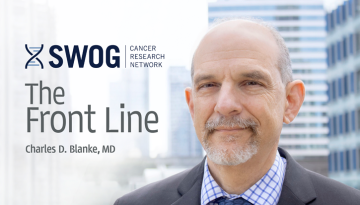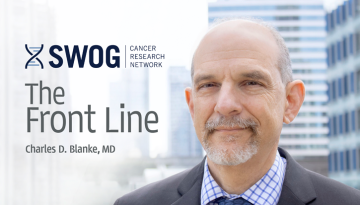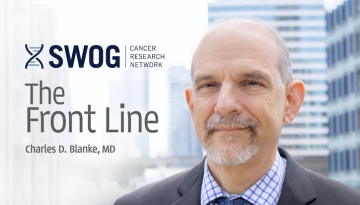Lung-MAP Broadens Trial Access for Some Groups
As compared to conventional, stand-alone clinical trials in advanced non-small cell lung cancer (NSCLC), the biomarker-driven Lung Cancer Master Protocol (Lung-MAP) has enrolled higher percentages of patients who are older, patients who are from rural or socioeconomically deprived areas, and patients who have Medicaid or no insurance.
These are some of the results of an analysis of the representativeness of the more than 3,500 patients enrolled to Lung-MAP from its 2014 launch through 2020. That work is being published in the journal JCO Precision Oncology.
Riha Vaidya, PhD, of the SWOG Statistics and Data Management Center and Fred Hutchinson Cancer Center, is lead author on the analysis.
“Lung-MAP is the first protocol conducted within the NCTN as a public–private partnership,” Vaidya said, referring to the National Clinical Trials Network. “There isn't any published data on whether this partnership approach improves access to clinical trials over conventionally conducted trials. So, our goal was to examine the sociodemographic characteristics of patients enrolled to Lung-MAP and how they compared to other SWOG trials for advanced NSCLC.”
The Lung-MAP partnership includes the National Cancer Institute (NCI) – part of the National Institutes of Health (NIH) – and its NCTN, including SWOG Cancer Research Network, and Friends of Cancer Research, the Foundation for the National Institutes of Health, Foundation Medicine, pharmaceutical companies that provide their drugs for the study, and several lung cancer advocacy organizations. The trial provides an infrastructure for conducting a portfolio of biomarker-driven clinical trials in NSCLC under a shared screening protocol.
A group of Lung-MAP researchers set out to determine whether the master protocol approach improved access to trials, particularly for groups historically underrepresented in clinical research studies.
The team examined sociodemographic characteristics for all 3,556 patients enrolled to the Lung-MAP screening protocol between the activation of the study in June 2014 and December 31, 2020. They compared Lung-MAP participant characteristics to those from a set of 2,215 patients enrolled to other, individual clinical trials in advanced NSCLC that were conducted by the SWOG Cancer Research Network.
Compared to patients enrolled to other NSCLC studies, Lung-MAP patients were more likely to be 65 years of age or older (57.2 percent versus 46.3 percent), to live in a rural area (17.3 percent versus 14.4 percent), to live in a neighborhood classified as socioeconomically deprived based on its Area Deprivation Index score (42.2 percent versus 36.7 percent), or to have Medicaid insurance or no health insurance (of patients younger than 65, 27.6 percent versus 17.8 percent).
Patients on Lung-MAP, however, were less likely than those enrolled on other trials to be female (38.6 percent versus 47.2 percent), to be Asian (2.8 percent versus 5.1 percent), or to be Hispanic (2.4 percent versus 3.8 percent). In explaining the underrepresentation of female patients, the authors note that before 2019, Lung-MAP enrollment was limited to patients with squamous cell carcinoma, a tumor histology that is significantly more common among men.
“Our finding of improved access to clinical trials for some underrepresented patient groups provides an opportunity to examine how we can apply site and patient engagement practices from Lung-MAP to other trials so we can reach more patients,” Vaidya said. “We have more work to do, particularly regarding representation of racial and ethnic minority groups. SWOG's DEI infrastructure will be critical in identifying and resolving barriers to trial access for these patient groups.”
The work was funded by the NCI/NIH through grants CA180888, CA180819, CA180820, CA180821, CA180868, CA189858, CA189821, CA189830, CA239767, CA189971, CA180826, CA180828, CA180846, and CA180858 and in part by AbbVie, Amgen, AstraZeneca, Bristol Myers Squibb, Genentech, and Pfizer through the Foundation for the National Institutes of Health, in partnership with Friends of Cancer Research.
In addition to Dr. Vaidya, co-authors on the paper include Joseph M. Unger, PhD, SWOG Statistics and Data Management Center and Fred Hutchinson Cancer Center; Lu Qian, MS, Fred Hutchinson Cancer Center; Katherine Minichiello, MS, SWOG Statistics and Data Management Center and Fred Hutchinson Cancer Center; Roy S. Herbst, MD, Yale Cancer Center; David R. Gandara, MD, UC Davis Comprehensive Cancer Center; Joel W. Neal, MD PhD, Stanford Cancer Institute; Ticiana A. Leal, MD, Winship Cancer Institute, Emory University; Jyoti D. Patel, MD, Northwestern University Feinberg School of Medicine; Konstantin H. Dragnev, MD, Dartmouth Cancer Center; Saiama N. Waqar, MD, Washington University School of Medicine; Martin J. Edelman, MD, Fox Chase Cancer Center, Temple University Health System; Ellen V. Sigal, PhD, Friends of Cancer Research; Stacey J. Adam, PhD, Foundation for the National Institutes of Health; Shakun Malik, MD, National Cancer Institute; Charles D. Blanke, MD, SWOG Cancer Research Network and Oregon Health and Science University; Michael L. LeBlanc, PhD, SWOG Statistics and Data Management Center and Fred Hutchinson Cancer Center; Karen Kelly, MD, UC Davis Comprehensive Cancer Center; Jhanelle E. Gray, MD, Moffitt Cancer Center; and Mary W. Redman, PhD, SWOG Statistics and Data Management Center and Fred Hutchinson Cancer Center.
Reference:
Vaidya R, Unger JM, Qian L, et al. “Representativeness of Patients Enrolled in the Lung Cancer Master Protocol (Lung-MAP).” DOI: 10.1200/PO.23.00218 JCO Precision Oncology no. 7 (2023) e2300218. Published online September 7, 2023.



